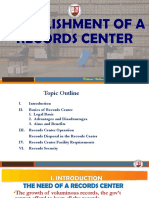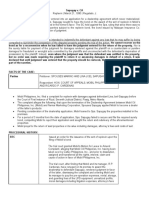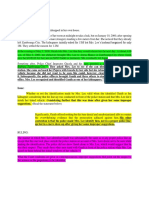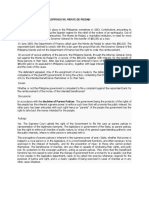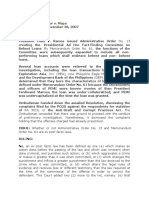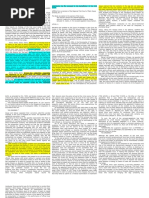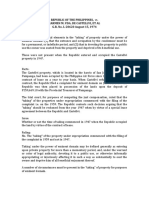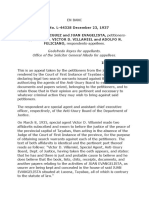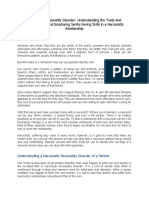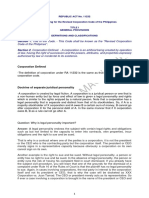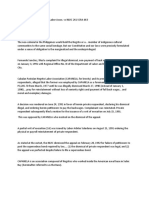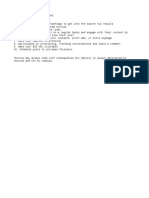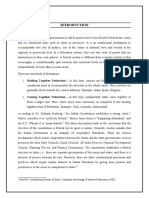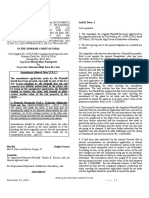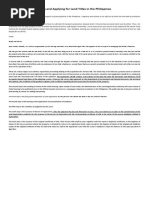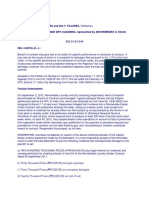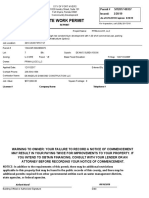Corpuz Vs People
Corpuz Vs People
Uploaded by
Dayana DawnieCopyright:
Available Formats
Corpuz Vs People
Corpuz Vs People
Uploaded by
Dayana DawnieOriginal Description:
Original Title
Copyright
Available Formats
Share this document
Did you find this document useful?
Is this content inappropriate?
Copyright:
Available Formats
Corpuz Vs People
Corpuz Vs People
Uploaded by
Dayana DawnieCopyright:
Available Formats
CORPUZ VS. REPUBLIC [194 SCRA 73; G.R. NO.
74259; 14 FEB 1991]
Facts: Generoso Corpuz is the Supervising Accounting Clerk in the Office of the Provincial Treasurer of
Nueva Viscaya. He was designated Acting Supervising Cashier in the said office. In this capacity, he
received collections, disbursed funds and made bank deposits and withdrawals pertaining to government
accounts. On April 13, 1981 his designation as Acting Supervising Cashier was terminated and a transfer
of accountabilities was effected between him and his successor. The Certificate of turnover revealed a
shortage of P72,823.00. He was able to pay only P10,159.50. After a final demand letter for the total of
P50,596.07 which was not met, a case of malversation was filed against him. Corpuz did
not deny such facts but he insists that the shortage was malversed by other persons. He alleged that
Paymaster Diosdado Pineda through 1 of 4 separate checks (PNB) issued and encashed such checks while
he was of leave. Also, Acting Deputy Provincial Treasurer Bernardo Aluning made to post the amount on
his cashbook although he had not received the said amount. He was convicted in Sandiganbayan.
Issue: Whether or Not Corpuz is guilty of malversation.
Held: It is a subtle way of camouflaging the embezzlement of the money equivalent when 1 of the 4
checks issued and encashed in the same day was entered in the accused’s cash book 3 months after such
encashments. Also, Corpuz claim that he was absent when Paymaster Diosdado Pineda through 1 of 4
separate checks (PNB) issued and encashed such checks, was not proven.
Post-Audit is not a preliminary requirement to filing a malversation case. The failure of the public officer
to have duly forthcoming any public funds with which he is chargeable, upon demand by an authorized
officer shall be a prima facie evidence that he has put such missing funds to personal use.
The equipoise rule(balancing test) which is the presumption of innocence is applicable only where the
evidence of the parties is evenly balance, in which case the scale of justice should be tilt in favor of the
accused. There is no such balance in the case at bar. The evidence of the prosecution is overwhelming
and has not been overcome by the petitioner with his claims. The presumed innocence must yield to the
positive finding that he is guilty of malversation.
Wherefore his petition is denied. He is guilty as principal of Malversation of Public Funds.
You might also like
- Records Center Administration (NAP) PDFDocument119 pagesRecords Center Administration (NAP) PDFDayana DawnieNo ratings yet
- PD 957 CasesDocument83 pagesPD 957 CasesDayana Dawnie100% (1)
- 84 People Vs Hernando DigestDocument1 page84 People Vs Hernando DigestRexNo ratings yet
- The Function of Ingredients in CakeDocument5 pagesThe Function of Ingredients in CakeDayana DawnieNo ratings yet
- JOHN HENRY DOE Conditional Acceptance For Mandatory VaccineDocument11 pagesJOHN HENRY DOE Conditional Acceptance For Mandatory VaccineAnonymous100% (4)
- 333 Sapugay v. CADocument3 pages333 Sapugay v. CAJoshua Ejeil PascualNo ratings yet
- C13 Cosculluela v. CA 1B-AMDocument2 pagesC13 Cosculluela v. CA 1B-AMazanezzNo ratings yet
- Ledesma V CADocument6 pagesLedesma V CAMarvinNo ratings yet
- Gumaua Vs ESPINODocument3 pagesGumaua Vs ESPINOYeshua TuraNo ratings yet
- People v. CacholaDocument10 pagesPeople v. CacholaEunicqa Althea SantosNo ratings yet
- People Vs Bauden 77 Phil 105 - GR L-270 - 1946 FULLDocument7 pagesPeople Vs Bauden 77 Phil 105 - GR L-270 - 1946 FULLRaphaela Grazia Gador RamosNo ratings yet
- PP vs. VillacampaDocument13 pagesPP vs. VillacampaJoshua CuentoNo ratings yet
- 5 Equal ProtectionDocument5 pages5 Equal ProtectionOmar Kareem MauricioNo ratings yet
- 14 Carpio Vs GuevaraDocument3 pages14 Carpio Vs GuevaraFaye Jennifer Pascua PerezNo ratings yet
- Comparative Presentation of Ra 9208 & 10364Document21 pagesComparative Presentation of Ra 9208 & 10364Lito ElvinaNo ratings yet
- 189 Matilde Jr. V JabsonDocument1 page189 Matilde Jr. V JabsonTraxex VentiNo ratings yet
- 2018 Sioco - v. - People20180417 1159 1rkys4wDocument4 pages2018 Sioco - v. - People20180417 1159 1rkys4wPark Chael Reose Eonni0% (1)
- SAMAHAN NG MANGGAGAWA vs. DIRECTOR NORIELDocument1 pageSAMAHAN NG MANGGAGAWA vs. DIRECTOR NORIELthinkbeforeyoutalkNo ratings yet
- People v. BaloloyDocument1 pagePeople v. BaloloySei KawamotoNo ratings yet
- Case Digest - People vs. AvancenaDocument1 pageCase Digest - People vs. AvancenaAngelina Villaver ReojaNo ratings yet
- PEOPLE VS. SUCRO - Committed in The Presence of Police OfficersDocument2 pagesPEOPLE VS. SUCRO - Committed in The Presence of Police OfficersAllayza Claire MacoyNo ratings yet
- PP Vs Marcos Daw (117 SCRA 999)Document7 pagesPP Vs Marcos Daw (117 SCRA 999)Ten LaplanaNo ratings yet
- Valdez v. AquilizanDocument5 pagesValdez v. AquilizanMary Joyce Lacambra AquinoNo ratings yet
- US V Bautista 6 Phil 581 (1906)Document7 pagesUS V Bautista 6 Phil 581 (1906)FranzMordenoNo ratings yet
- Digest People Vs Ganih 621 SCRA 159 (2010)Document1 pageDigest People Vs Ganih 621 SCRA 159 (2010)Leo FelicildaNo ratings yet
- Facts:: Jalandoni vs. Drilon, GR No. 115239-40Document3 pagesFacts:: Jalandoni vs. Drilon, GR No. 115239-40Analiza AlcoseroNo ratings yet
- Hildawa V EnrileDocument14 pagesHildawa V EnrileJulius ManaloNo ratings yet
- People vs. Orita, G.R. No. 88724. April 3, 1990Document3 pagesPeople vs. Orita, G.R. No. 88724. April 3, 1990Anna BarbadilloNo ratings yet
- People V CastroDocument2 pagesPeople V CastroAnn QuebecNo ratings yet
- Constitutional Law2 Lagcao Vs Judge Labra GR No 155746 January 30, 2020 CASE DIGESTDocument3 pagesConstitutional Law2 Lagcao Vs Judge Labra GR No 155746 January 30, 2020 CASE DIGESTBrenda de la GenteNo ratings yet
- Monte de Piedad CaseDocument1 pageMonte de Piedad CaseFenina ReyesNo ratings yet
- Presidential Ad Hoc Fact-Finding Committee On Behest Loans vs. Aniano DesiertoDocument14 pagesPresidential Ad Hoc Fact-Finding Committee On Behest Loans vs. Aniano Desiertojon_cpaNo ratings yet
- People vs. SungaDocument2 pagesPeople vs. SungaAlona Medalia Cadiz-GabejanNo ratings yet
- Jose Jesus M Disini JR Vs The Secretary of JusticeDocument9 pagesJose Jesus M Disini JR Vs The Secretary of JusticeJenniferNo ratings yet
- PEOPLE VDocument13 pagesPEOPLE VCarlos DauzNo ratings yet
- 94 - Salvador v. MapaDocument2 pages94 - Salvador v. MapaSealtiel VillarealNo ratings yet
- Alegre Vs Reyes DigestDocument3 pagesAlegre Vs Reyes DigestEric TamayoNo ratings yet
- A-No. 20 Del Rosario v. Pascua JDocument2 pagesA-No. 20 Del Rosario v. Pascua JThea Damole CapuyanNo ratings yet
- Republic (DAR) v. Court of AppealsDocument3 pagesRepublic (DAR) v. Court of AppealsJ. JimenezNo ratings yet
- People V Zaspa Full TextDocument3 pagesPeople V Zaspa Full TextGlen BasiliscoNo ratings yet
- Yapyucu V SandiganbayanDocument25 pagesYapyucu V SandiganbayanGillian Elliot AlbayNo ratings yet
- Teehankee v. Rovira, G.R.No. L 101, Dec. 20, 1945 DigestDocument2 pagesTeehankee v. Rovira, G.R.No. L 101, Dec. 20, 1945 Digestzanjknight100% (1)
- Republic vs. CastellviDocument2 pagesRepublic vs. CastellviHansel Jake B. PampiloNo ratings yet
- Consti 2 Digest 132 Govt of Usa Vs Judge PurgananDocument13 pagesConsti 2 Digest 132 Govt of Usa Vs Judge PurgananRed HoodNo ratings yet
- Silverio vs. Court of AppealsDocument1 pageSilverio vs. Court of AppealsCC MacasaetNo ratings yet
- PFR Quiz 1Document6 pagesPFR Quiz 1Toni YingNo ratings yet
- Var Orient Shipping Vs AchasoDocument1 pageVar Orient Shipping Vs AchasoprimeNo ratings yet
- Estrada V DesiertoDocument2 pagesEstrada V DesiertoRJ TurnoNo ratings yet
- People V Doriquez G.R. No. L24444-45 July 29, 1968Document5 pagesPeople V Doriquez G.R. No. L24444-45 July 29, 1968dondzNo ratings yet
- People Vs Villareal Power PointDocument12 pagesPeople Vs Villareal Power PointAnna Marie DayanghirangNo ratings yet
- Estrada v. Arroyo Petitioner: Joseph Estrada Respondent: Gloria Macapagal-Arroyo Topic: Executive - Succession FactsDocument4 pagesEstrada v. Arroyo Petitioner: Joseph Estrada Respondent: Gloria Macapagal-Arroyo Topic: Executive - Succession FactsSocNo ratings yet
- Rodriguez vs. VillamielDocument7 pagesRodriguez vs. VillamielAlfred DanezNo ratings yet
- People vs. FernandezDocument9 pagesPeople vs. FernandezEarlene DaleNo ratings yet
- Amarga Vs AbbasDocument2 pagesAmarga Vs Abbasclifford tubanaNo ratings yet
- People Vs AlbiorDocument5 pagesPeople Vs AlbiorSachuzenNo ratings yet
- 178-PEOPLE OF THE PHILIPPINES vs. ALBERTO ESTOISTADocument1 page178-PEOPLE OF THE PHILIPPINES vs. ALBERTO ESTOISTABeatrice AbanNo ratings yet
- Abad Santos, J.Document16 pagesAbad Santos, J.Amiel NunezNo ratings yet
- PEOPLE V MALASUGUIDocument2 pagesPEOPLE V MALASUGUISafenaz MutilanNo ratings yet
- Melo Vs PeopleDocument1 pageMelo Vs PeopleChris InocencioNo ratings yet
- People V Damaso 212 SCRA 457Document6 pagesPeople V Damaso 212 SCRA 457John Basil ManuelNo ratings yet
- Serafin Vs LindayagDocument1 pageSerafin Vs LindayaggerlynNo ratings yet
- Aguas v. Sandiganbayan DigestDocument4 pagesAguas v. Sandiganbayan DigestRobyn BangsilNo ratings yet
- People Vs OpidaDocument6 pagesPeople Vs OpidaFrancis Coronel Jr.No ratings yet
- Vargas Case Digests - : Mcia V. Court of AppealsDocument1 pageVargas Case Digests - : Mcia V. Court of AppealsAdrian Jeremiah VargasNo ratings yet
- Corpuz vs. PeopleDocument1 pageCorpuz vs. PeoplePaul Joshua Torda SubaNo ratings yet
- Sweet Diana Dawn Paller: Desired Position: Legal ResearcherDocument2 pagesSweet Diana Dawn Paller: Desired Position: Legal ResearcherDayana DawnieNo ratings yet
- Creative Ways To Make A Cake Without An OvenDocument4 pagesCreative Ways To Make A Cake Without An OvenDayana DawnieNo ratings yet
- BIBLIOGRAPHYDocument2 pagesBIBLIOGRAPHYDayana DawnieNo ratings yet
- What Ingredients Do You Need To Make CupcakesDocument5 pagesWhat Ingredients Do You Need To Make CupcakesDayana DawnieNo ratings yet
- Narcissistic Personality Disorder DraftDocument5 pagesNarcissistic Personality Disorder DraftDayana DawnieNo ratings yet
- Thesis On Human RightsDocument1 pageThesis On Human RightsDayana DawnieNo ratings yet
- ClickFunnels Pricing PlansDocument6 pagesClickFunnels Pricing PlansDayana DawnieNo ratings yet
- People V. Januario G.R. NO. 98252 FEBRUARY 7, 1997 FactsDocument7 pagesPeople V. Januario G.R. NO. 98252 FEBRUARY 7, 1997 FactsDayana DawnieNo ratings yet
- Title 1 CasesDocument1 pageTitle 1 CasesDayana DawnieNo ratings yet
- Baking Sheet Vs Cooking SheetDocument4 pagesBaking Sheet Vs Cooking SheetDayana DawnieNo ratings yet
- Title 1 DiscussionDocument10 pagesTitle 1 DiscussionDayana DawnieNo ratings yet
- Cases 10 13Document7 pagesCases 10 13Dayana DawnieNo ratings yet
- IG Followers TipsDocument1 pageIG Followers TipsDayana DawnieNo ratings yet
- JenniBelle Boutique The Number One Stylist Boutique in The Pearland and Lake Jackson, TexasDocument3 pagesJenniBelle Boutique The Number One Stylist Boutique in The Pearland and Lake Jackson, TexasDayana DawnieNo ratings yet
- Best Boutique in Houston Texas Perfect Fall Wedding OutfitsDocument4 pagesBest Boutique in Houston Texas Perfect Fall Wedding OutfitsDayana DawnieNo ratings yet
- The Spring 2021 Trendsetter - Your Fashion Must-Haves!Document4 pagesThe Spring 2021 Trendsetter - Your Fashion Must-Haves!Dayana DawnieNo ratings yet
- The Biggest Fall Fashion Trends in 2021Document4 pagesThe Biggest Fall Fashion Trends in 2021Dayana DawnieNo ratings yet
- Makati City Ordinance 002-09Document3 pagesMakati City Ordinance 002-09alexjalecoNo ratings yet
- DOTR Memorandum Circular No. 017-2016Document21 pagesDOTR Memorandum Circular No. 017-2016Anonymous dtceNuyIFINo ratings yet
- Pant HG, Constitutional System of India-Continuity and Change (Vasudeva Publications 1983)Document6 pagesPant HG, Constitutional System of India-Continuity and Change (Vasudeva Publications 1983)Sanya RastogiNo ratings yet
- Case SummaryDocument8 pagesCase SummaryNikhil VishalNo ratings yet
- Mount Mary Case O 6 R 17Document2 pagesMount Mary Case O 6 R 17Aditya Bhardwaj100% (1)
- John Millham, To His Own Use and To The Use of William Ashburn, II v. Globe American Casualty Company, 912 F.2d 463, 4th Cir. (1990)Document4 pagesJohn Millham, To His Own Use and To The Use of William Ashburn, II v. Globe American Casualty Company, 912 F.2d 463, 4th Cir. (1990)Scribd Government DocsNo ratings yet
- Sanders v. Madison Square Garden, L.P. Et Al - Document No. 127Document11 pagesSanders v. Madison Square Garden, L.P. Et Al - Document No. 127Justia.com100% (1)
- Sample Motion To Dismiss Under Rule 12 (B) (2) in United States District CourtDocument3 pagesSample Motion To Dismiss Under Rule 12 (B) (2) in United States District CourtStan BurmanNo ratings yet
- Karan ProjectDocument13 pagesKaran Projectsakshi srivastavNo ratings yet
- Morana v. RepublicDocument11 pagesMorana v. RepublicRubierosse0% (1)
- Angobung Vs COMELECDocument2 pagesAngobung Vs COMELECJohn Soliven100% (1)
- United States Court of Appeals Tenth CircuitDocument5 pagesUnited States Court of Appeals Tenth CircuitScribd Government DocsNo ratings yet
- City of Edgerton OrdinancesDocument636 pagesCity of Edgerton OrdinancesCity of Edgerton100% (2)
- Mobasser Monem AssigenmentDocument8 pagesMobasser Monem AssigenmentMirza ArnabNo ratings yet
- Registration Form CwtsDocument1 pageRegistration Form CwtsCDT. KATE NICOLE TANNo ratings yet
- Land Titled in RPDocument1 pageLand Titled in RPJonas CuNo ratings yet
- 130 Darcen vs. V.R. Gonzales Credit Enterprises, Inc.Document16 pages130 Darcen vs. V.R. Gonzales Credit Enterprises, Inc.유니스No ratings yet
- Royal Canadian Mounted Police Are Vindictive Big Sucky Babies!Document106 pagesRoyal Canadian Mounted Police Are Vindictive Big Sucky Babies!WalliveBellairNo ratings yet
- Pajares vs. Solis Case DigestDocument8 pagesPajares vs. Solis Case DigestSe'f BenitezNo ratings yet
- Atty Echanez PDFDocument6 pagesAtty Echanez PDFNotario PrivadoNo ratings yet
- Training Contract IELTS IntensiveDocument3 pagesTraining Contract IELTS Intensivecarla iNo ratings yet
- (Prima Luce) Site Work PermitDocument1 page(Prima Luce) Site Work Permitnguyen hungNo ratings yet
- Gcn031997-Guidelines On AdvertisingDocument2 pagesGcn031997-Guidelines On AdvertisingAndrea WongNo ratings yet
- Pdic vs. GidwaniDocument5 pagesPdic vs. Gidwaniheyooo100% (1)
- Rico vs. Salutan PDFDocument4 pagesRico vs. Salutan PDFEzra LequiganNo ratings yet
- EKuhipath-eKuhiCA Current Affairs, Monthly Magazine, September 2023Document99 pagesEKuhipath-eKuhiCA Current Affairs, Monthly Magazine, September 2023temp255248No ratings yet
- Sec. of Justice v. Koruga - Golden RuleDocument13 pagesSec. of Justice v. Koruga - Golden RulebrownboomerangNo ratings yet
- Palencia v. LinsanganDocument3 pagesPalencia v. LinsanganAlyssa joy TorioNo ratings yet
